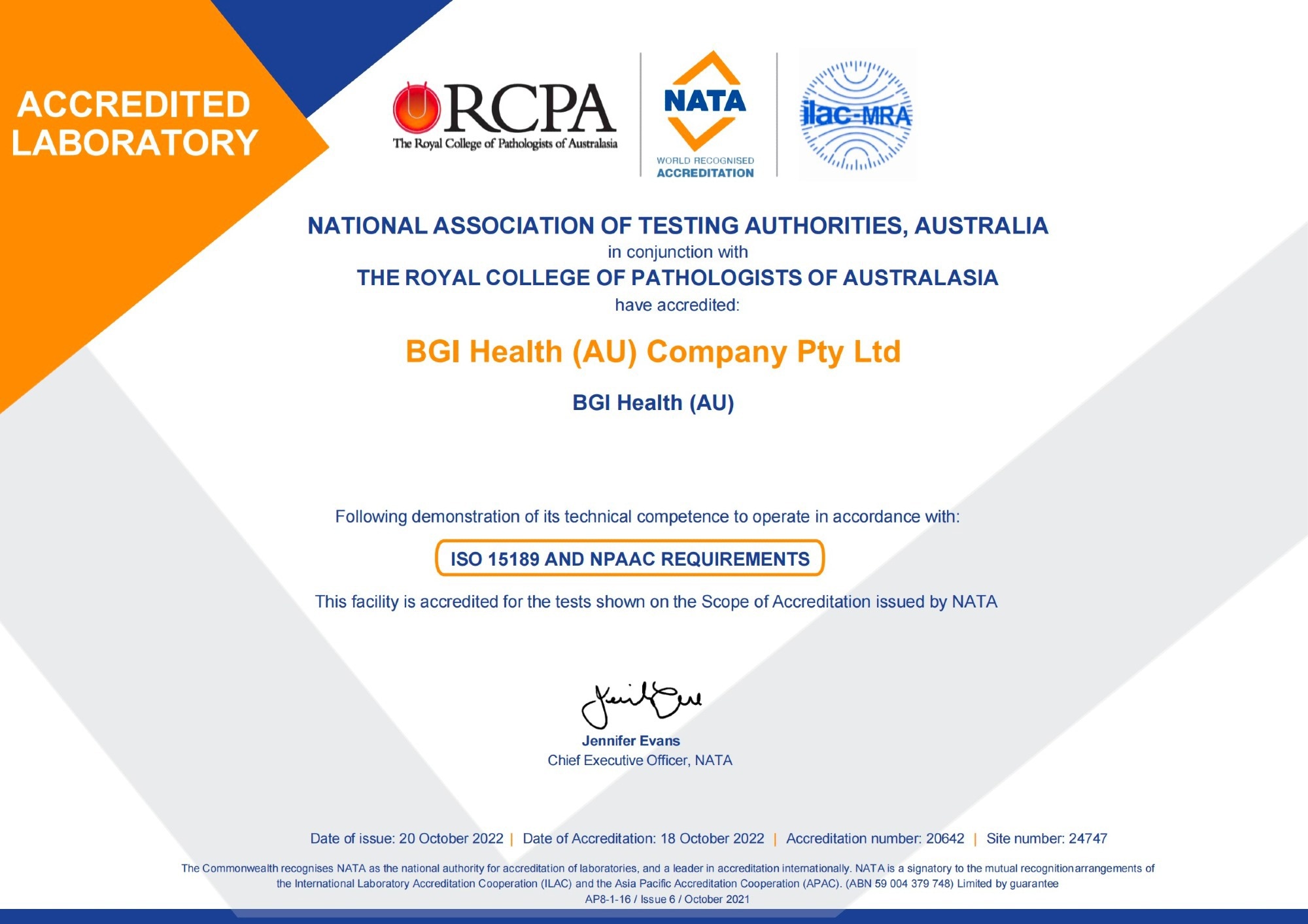The National Association of Testing Authorities (NATA) has accredited BGI Australia’s lab to conduct clinical Whole Exome Sequencing in Australia, opening the door for the multinational life sciences company to offer clinical sequencing services for locating potential disease-causing genetic changes.

Image Credit: BGI
After acquiring NATA’s Human Pathology Laboratory Accreditation, the lab will begin to offer clinical services in Australia for the first time, adding to the many regulatory licenses that BGI Group has already secured for its international laboratories and activities.
The National Pathology Accreditation Advisory Council (NPAAC) has established accreditation requirements for pathology laboratories, which are met by the NATA accreditation, and incorporates the globally recognized ISO 15189.
As a world-class life sciences organization, BGI Group continues to lead the development of the industry, including a strong emphasis on quality management. We will continue to simultaneously develop science, technology, standards, quality, and intellectual property, with the aim of driving further developments that improve the health of mankind.”
Dr Ye Yin, Chief Executive Officer, BGI Group
Australian researchers have benefited from the 460 m2 BGI Australia laboratory, which is housed at the Brisbane-based QIMR Berghofer Medical Research Institute. The lab will reach a larger audience with its NATA-accredited clinical Whole Exome Sequencing service.
The Therapeutic Goods Administration (TGA), the Australian government’s therapeutic and medical regulatory body, has authorized the high-throughput genetic sequencer MGI DNBSEQ-G400, which will be used for the Whole Exome Sequencing services.
With the help of the certification, BGI Australia is better able to assist clinical laboratories, hospitals, and other partners in identifying exome alterations that lead to uncommon genetic and pediatric diseases.
BGI Australia will build on the lessons learned throughout the certification process to broaden the testing services it offers, showcase its clinical solutions expertise, and pursue collaborations for technology transfer to increase community testing accessibility.
NATA’s accreditation procedures are extremely rigorous, and it is a significant achievement that our laboratory, the MGI DNBSEQ-G400 platform that performs clinical Whole Exome Sequencing, and the procedures implemented by our technicians have qualified for the NATA accreditation. We will continue to improve and increase the accessibility of clinical sequencing to clinical laboratories, research institutes, and hospitals.”
Dr Bicheng Yang, Director, BGI Australia
The four-layer document system of Quality Management, Quality Procedure, Standard Operating Procedures, and Record Management, in addition to everything else, must all comply with NATA’s quality system criteria. The laboratory will undergo routine NATA inspections to guarantee that all quality requirements are still being complied with.
The lab works in a closed-loop system, therefore data communication, storage, and the method for data deletion are crucial components of NATA’s accreditation of the facility. The lab’s whole data set is kept in Australia. BGI Australia is required to uphold NPAAC standards for the retention and destruction of process-related data.
More than 100 international quality system certifications held by BGI Group globally regulate its laboratories’ operations and guarantee that the company complies with all local laws, notably those pertaining to data protection and regulation.
Exomes are the entire set of exons found in a genome, and they make up the portion of a person’s genetic code that contains the instructions for producing proteins. Exon sequencing is a useful diagnostic technique since the bulk of genetic alterations now recognized to cause illness occurs in or very close to exons.
In comparison to traditional diagnostic techniques, whole exome sequencing has been proven to boost diagnostic yield. It is effective, affordable, and widely utilized for genome sequencing.
It has previously been proven to be an essential component of genetic detection and clinical diagnosis, and it has been shown to significantly shorten the diagnostic odyssey (number of tests and time to diagnosis) for a significant fraction of patients when used early enough.
The largest independent accrediting authority in Australia is NATA, the oldest accreditation body in the world, and ISO 15189 is an international standard that specifies the qualifications that diagnostic laboratories must meet to give findings that are accurate, timely, and trustworthy.
BGI Australia had to pass a lengthy accreditation procedure that included an independent evaluation of the laboratory’s people, equipment, quality assurance of process controls, and sample handling, as well as data security and confidentiality.
The BGI Australia local staff are some of the highest qualities I have worked with. Receiving accreditation means that they can now service clinical Whole Exome Sequencing for any laboratories or hospitals that require it. This is the biggest growth area in medicine and any extra testing capacity is important as it may allow more patients to get results in a more timely manner.”
Dr Peter Kaub, Genetic Pathologist and Medical Consultant, BGI Australia